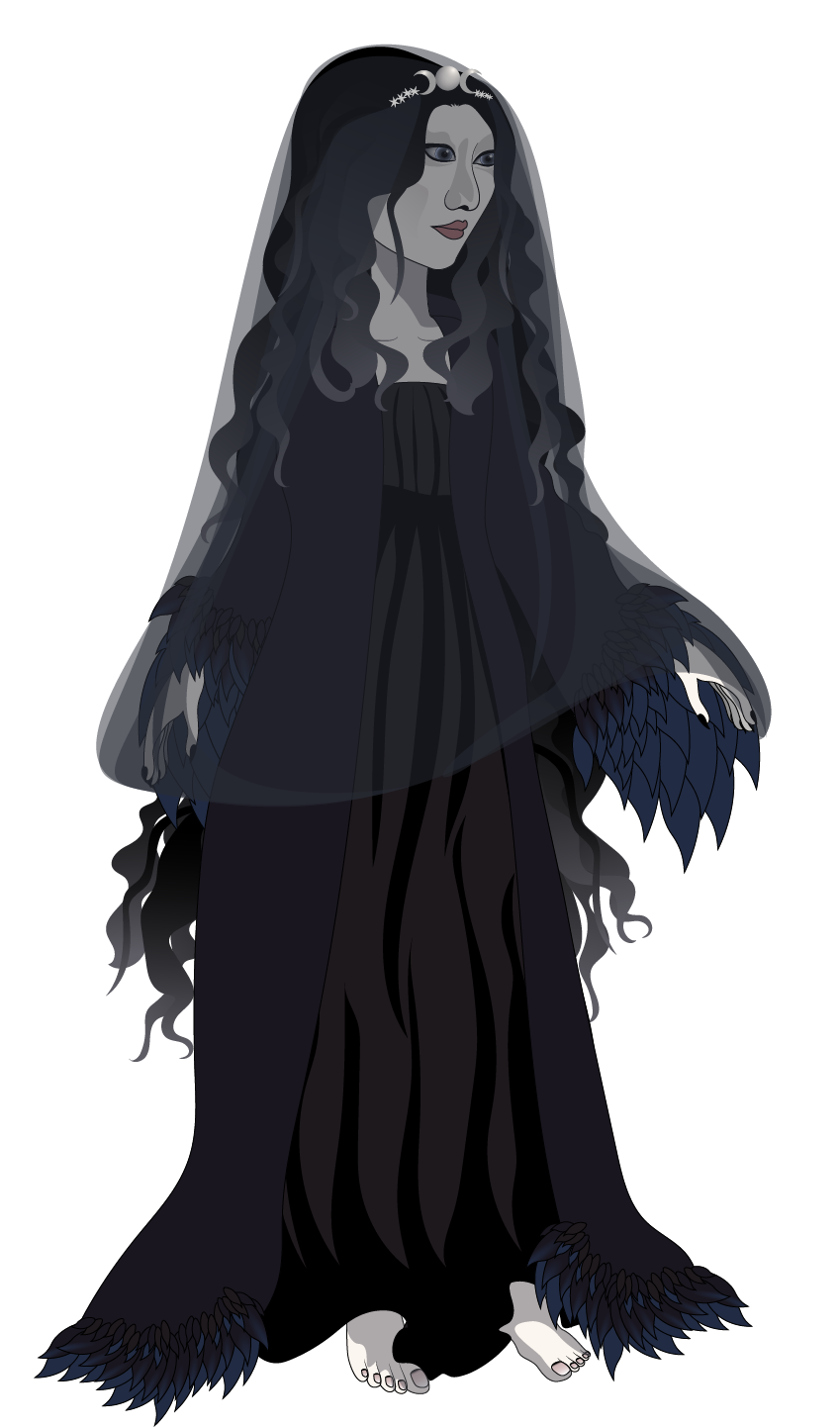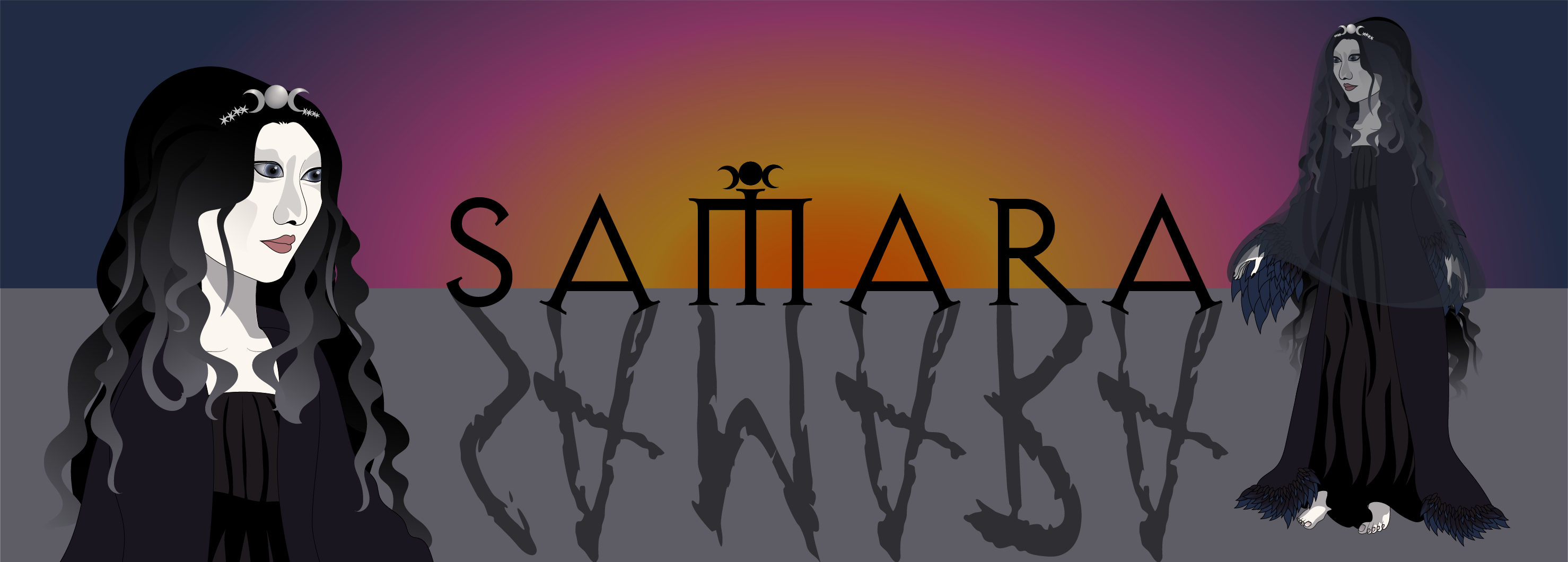Samara The Grave Mystic
Chosen of The Morrigan, Daughter of the Blackened Man, Haunted by the Twilight Night & Wanderer of The Path.
In the years before the world soured and the sky forgot how to sing, there was a woman named Samara. At least, that is what the old stories claim. The rest — her surname, her lineage, the faces of those who once called her daughter — have long since been carried off by the wind.
Those who meet her do not ask for her name.
They already know.
In the years before the world soured and the sky forgot how to sing, there was a woman named Samara. At least, that is what the old stories claim. The rest — her surname, her lineage, the faces of those who once called her daughter — have long since been carried off by the wind.
Show spoiler
And so Samara walks still. A creature of fate, a daughter of death, a wandering shadow upon the roads of Aevania.
Samara was born to two pilgrims who walked from the mist-wreathed city of Lanrey to the forsaken outpost of Balenrest. Their hearts heavy with faith, their footsteps light with purpose, they followed the old, half forgotten rites of The Morrigan; the goddess of fate, death, and battle, she who tends the strands of mortal lives and chooses the hour of every end.
They say it was during one of the worst storms of the turning year that Samara came screaming into the world. Or rather — did not scream. She was born silent, beneath the cleaving black sky, amid the wild moan of wind through the trees. Her mother wept; her father begged the heavens. And somewhere in the storm, something answered.
The Morrigan, dark-winged and watching, heard their desperate prayers. She stayed her hand and spared the child, but the gods do not trade in mercy without price. Samara lived, but she was… altered. She did not cry as an infant. She spoke words she should not have known. She watched the world with ancient eyes. By the time the family reached Balenrest, they were ragged and weary things, settling in a hovel at the city’s frayed edge, forgotten by fortune and favored only by fate. Samara, though, cared little for hunger or cold. Her mind dwelled on the unseen currents of the world — strange visions, the whisper of dead leaves, the pattern of carrion crows in flight.
It was not long before tragedy, like a patient lover, found them.
One night, cloaked in ash and the scent of old blood, a raiding party from the Barren Expanse fell upon them. Twisted things, half-men, half-nightmare. Samara was five. They were taken in chains to a soot-blackened village, a place that stank of smoke and old bones, where her parents were shackled and set to break their bodies for cruel masters.
Her mother died first.
It was there, in the moment her mother’s soul slipped loose of her mortal coil, that Samara saw her: The Morrigan. Winged and terrible and beautiful. The goddess guided the soul beyond the veil, and Samara, tiny and brittle in the cold, felt something like awe for the first time. Death, she realized, was not an end but a passage. A thing to be guided. A fate to be sung.
Her father lasted longer, but fate is a tireless hunter. The endless toil broke him. And when his body fell at last to the dust, Samara spoke a word she did not know she knew. A bell tolled in the emptiness — clear, cold, final — and several of the slavers fell dead where they stood, their souls gathered like wheat at harvest. They called her Death-Child after that. And the leader of that place, a cruel wretch known only as the Blackened Man, claimed her as his own. Not out of love, but out of fear and reverence.
Years turned like dead leaves. Samara became a whisper, a figure of omen. A soothsayer, a pale girl with sunken eyes who could see the hour of a man’s death written in the lines of his face. Villages from miles around sought her out to ease the passing of their dead, to banish restless spirits, to read the crows in the morning sky.
But the gods are cruel to those they favour.
At seventeen, a warband of zealots razed the village. A broken paladin, his faith turned sour in his mouth, ran Samara through with a blackened blade. In the moment of death, she came face to face with The Morrigan once more.
The goddess offered no kindness. Only a choice. A second breath, in service to death itself.
Samara did not hesitate.
When her eyes opened again, the world reeled. Necrotic power surged from her broken form. The paladin was undone in an instant, his soul shredded and scattered to the void. The warband fled. The village was cinders and bone. The Blackened Man lay among the fallen.
Those few who survived called it The Twilight Night.
Samara left them to their fear.
In the years that followed, she wandered. A half-living thing, unageing, untouched by hunger or warmth. Names fell from her memory like old leaves from a dying tree: her surname, the names of her parents, the village, the faces of those she once mourned. Only her duty remained.
Where death lurked, she followed. Where the dead cried out, she answered. The rites of the Morrigan passed through her lips in the dark hours before dawn. The toll of the bell, the binding of lost souls, the ushering of the dead into whatever lay beyond.
And then, one night upon a lonely road, the sky split like old paper. A vision came — of a relic, ancient and holy, its power a beacon in the gathering dusk of the world. The Morrigan’s voice whispered:
"Find it. It was always meant for you."
They say it was during one of the worst storms of the turning year that Samara came screaming into the world. Or rather — did not scream. She was born silent, beneath the cleaving black sky, amid the wild moan of wind through the trees. Her mother wept; her father begged the heavens. And somewhere in the storm, something answered.
The Morrigan, dark-winged and watching, heard their desperate prayers. She stayed her hand and spared the child, but the gods do not trade in mercy without price. Samara lived, but she was… altered. She did not cry as an infant. She spoke words she should not have known. She watched the world with ancient eyes. By the time the family reached Balenrest, they were ragged and weary things, settling in a hovel at the city’s frayed edge, forgotten by fortune and favored only by fate. Samara, though, cared little for hunger or cold. Her mind dwelled on the unseen currents of the world — strange visions, the whisper of dead leaves, the pattern of carrion crows in flight.
It was not long before tragedy, like a patient lover, found them.
One night, cloaked in ash and the scent of old blood, a raiding party from the Barren Expanse fell upon them. Twisted things, half-men, half-nightmare. Samara was five. They were taken in chains to a soot-blackened village, a place that stank of smoke and old bones, where her parents were shackled and set to break their bodies for cruel masters.
Her mother died first.
It was there, in the moment her mother’s soul slipped loose of her mortal coil, that Samara saw her: The Morrigan. Winged and terrible and beautiful. The goddess guided the soul beyond the veil, and Samara, tiny and brittle in the cold, felt something like awe for the first time. Death, she realized, was not an end but a passage. A thing to be guided. A fate to be sung.
Her father lasted longer, but fate is a tireless hunter. The endless toil broke him. And when his body fell at last to the dust, Samara spoke a word she did not know she knew. A bell tolled in the emptiness — clear, cold, final — and several of the slavers fell dead where they stood, their souls gathered like wheat at harvest. They called her Death-Child after that. And the leader of that place, a cruel wretch known only as the Blackened Man, claimed her as his own. Not out of love, but out of fear and reverence.
Years turned like dead leaves. Samara became a whisper, a figure of omen. A soothsayer, a pale girl with sunken eyes who could see the hour of a man’s death written in the lines of his face. Villages from miles around sought her out to ease the passing of their dead, to banish restless spirits, to read the crows in the morning sky.
But the gods are cruel to those they favour.
At seventeen, a warband of zealots razed the village. A broken paladin, his faith turned sour in his mouth, ran Samara through with a blackened blade. In the moment of death, she came face to face with The Morrigan once more.
The goddess offered no kindness. Only a choice. A second breath, in service to death itself.
Samara did not hesitate.
When her eyes opened again, the world reeled. Necrotic power surged from her broken form. The paladin was undone in an instant, his soul shredded and scattered to the void. The warband fled. The village was cinders and bone. The Blackened Man lay among the fallen.
Those few who survived called it The Twilight Night.
Samara left them to their fear.
In the years that followed, she wandered. A half-living thing, unageing, untouched by hunger or warmth. Names fell from her memory like old leaves from a dying tree: her surname, the names of her parents, the village, the faces of those she once mourned. Only her duty remained.
Where death lurked, she followed. Where the dead cried out, she answered. The rites of the Morrigan passed through her lips in the dark hours before dawn. The toll of the bell, the binding of lost souls, the ushering of the dead into whatever lay beyond.
And then, one night upon a lonely road, the sky split like old paper. A vision came — of a relic, ancient and holy, its power a beacon in the gathering dusk of the world. The Morrigan’s voice whispered:
"Find it. It was always meant for you."
Those who meet her do not ask for her name.
They already know.

Current Location
Age
17 maybe she looks young
Children
Pronouns
She/Her
Sex
Female
Gender
Woman
Presentation
Feminine
Eyes
Dark with a shimmer of something that could be mistaken for blue
Hair
Black like the deepest depths of night
Skin Tone/Pigmentation
Icey cold white almost grey like stone
Belief/Deity
The Morrigan



Comments